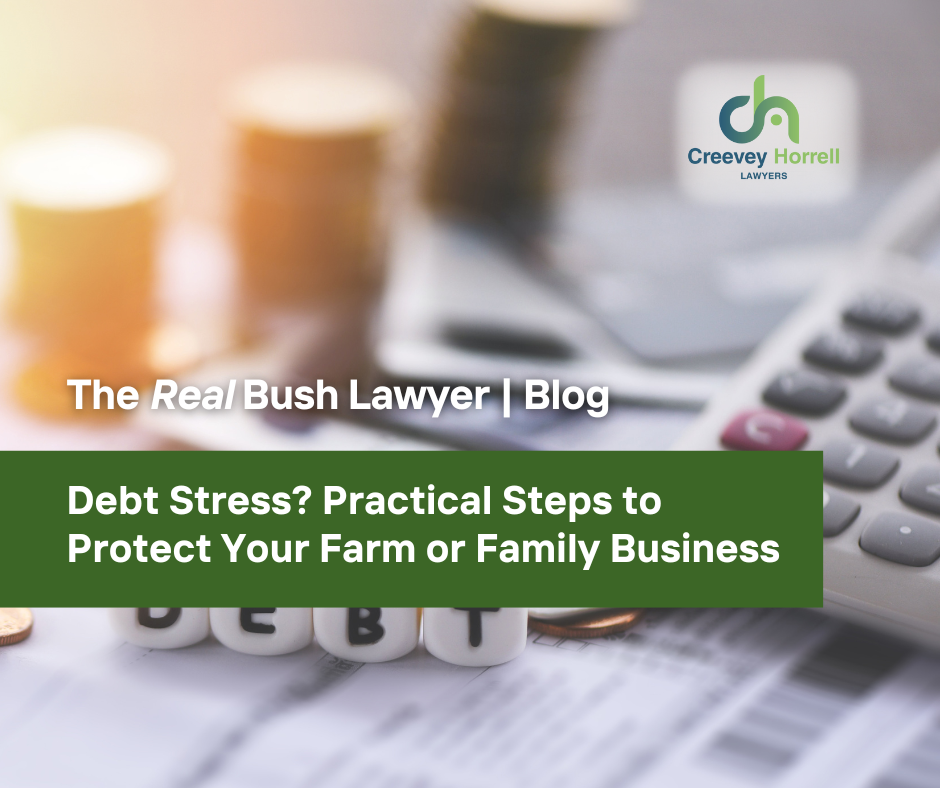Social Media for Agribusiness: Before You Hit "Post"
- Creevey Horrell Lawyers

- Jun 10, 2025
- 3 min read

If you’re running agribusiness these days, you are likely not just spending all your time on the farm or in your warehouse. Chances are, you’re also active on Instagram, Facebook or TikTok.
It is undeniable that social media is an important tool, especially for agribusinesses and regional businesses, to improve sales, build branding, share your backstory, and engage with clients and community. But, like a second-hand tractor, it comes with invisible risks – especially if you have minimal expertise using it!
Let’s talk about some ways to minimise your legal liability before you hit that ‘post’ button.
Don’t Make Misleading Claims
The rule here is basic, if it’s not true, don’t say it.
Schedule 2 of the Competition and Consumer Act 2010 (Cth) states:
“A person must not, in trade or commerce, engage in conduct that is misleading or deceptive or is likely to mislead or deceive.”
In short, the law provides that businesses should not make statements that are false, misleading and deceptive. This is applicable to all kinds of advertisements, including social media posts.
For example, adding “chemical-free” on your produce without certification is misleading. Saying “We’re the cheapest in Queensland” without proof is a false claim.
Consumers rely on your claims, even just the ‘harmless’ exaggeration or hyperbole can get you in trouble. If your claim turns out to be untrue, you could be violating the law.
As a tip, always double check your facts, and have proofs of your claims ready, so that when somebody questions it, you have something to show!
Be Aware of What You’re Advertising
It’s not uncommon for businesses to offer “free” products and simply ask you to post about them on social media. But if there’s an expectation that you’ll share content in return, it may be a form of advertising, and those products aren’t really “free”.
Under the Competition and Consumer Act 2010 (Cth), it is unlawful to engage in misleading or deceptive conduct in trade or commerce. This applies just as much to posts about someone else’s products as it does to your own. If you’re promoting another business’s goods or services, your statements must be accurate and not misleading. For example, don’t write “I love this product, I use it every day” if that isn’t true, or claim “this pesticide is the best on the market” unless you can back it up with credible evidence.
Both the Australian Competition and Consumer Commission (ACCC) and the Australian Association of National Advertisers (AANA) require that any material connection, such as receiving payment, gifts, or incentives, be clearly disclosed. Failing to do so could mislead consumers and breach the law.
If you have received goods, services, or money to promote another business’s product, you should be transparent in your social media posts. Use clear tags to identify these posts as ads or as part of a paid partnership. Or better yet, state plainly in your caption or video that you’re doing a paid promotion.
Use Your Own Photos or Videos
Unfortunately, saying “I googled it” does not mean you own it. It may be tempting to use that perfectly lit photo of freshly harvested tomatoes, but if it’s not yours, or you don’t have a license for it, you shouldn’t use it. Otherwise, you could be infringing copyright.
Just sharing a meme? That may still be considered a copyright infringement.
Best-case scenario? The original creator might simply ask you to remove or delete it. But worst-case? You could be sued or receive a demand for payment.
It is therefore best to use your own photos and videos or use licensed media. As an alternative, you can source digital content from legitimate free-media libraries online.
Keep Rivals Out of Your Reels
A competitor stealing your idea? Or a supplier cutting corners? Yes, it can be annoying. But hold off from ranting about them on Facebook or making a Reel to expose them.
Naming and shaming a competitor, supplier, or downstream vendor on social media can get you in hot water. You can be held liable for defamation if what you say is not true and harms their reputation. If you criticise them falsely, you could also be at risk of engaging in misleading or deceptive conduct. Additionally, if you have contractual relations with the offending business, then you might be breaching your contract by posting about them.
It's always best to present yourself (and your business) professionally online. Document everything but keep issues private. Consult your lawyer before going public about a dispute.
The Best Recourse?
Post with care. Online activity may appear harmless, but the law does not always distinguish between online and offline communication.
Social media is a powerful way to connect with your customers, grow your business and tell your story. But as the wise saying goes, “With great power comes great responsibility”. Post with integrity, legal awareness and, above all, respect.
It’s smart, strategic, and informed to be aware of your legal obligations before you post. It can even save you money in the long run.
So, the next time you make that post, stop and think.
Still a little unsure? Get in touch with us. We can help you navigate the legal implications that come with furthering your business on social media.
.png)




Comments